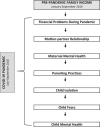Child and Maternal Mental Health Before and During the COVID-19 Pandemic: Longitudinal Social Inequalities in a Brazilian Birth Cohort
- PMID: 36075481
- PMCID: PMC9441217
- DOI: 10.1016/j.jaac.2022.07.832
Child and Maternal Mental Health Before and During the COVID-19 Pandemic: Longitudinal Social Inequalities in a Brazilian Birth Cohort
Abstract
Objective: The coronavirus disease 2019 (COVID-19) pandemic has caused major stress for families and children, particularly in the context of prolonged school closures. Few longitudinal studies are available on young children's mental health, including data both before and during the pandemic. This study examined experiences that might increase risk for mental health problems among caregivers and young children during the COVID-19 pandemic and inequalities driven by pre-pandemic disadvantage.
Method: This prospective, population-based birth cohort study in Pelotas, Brazil, analyzed 2,083 children and caregivers with data from before the pandemic in 2019, when children were 4 years old, and again in 2020, when schools were closed for a long period during the pandemic. Child conduct problems, emotional problems, and hyperactivity-inattention problems were assessed using the Strengths and Difficulties Questionnaire. Family financial hardship, relationship difficulties, caregiver mental health, parenting practices, and child fears and isolation were considered as potential risk factors.
Results: Across the whole population, the only significant increase in mental health problems from before to during the pandemic was found for maternal depression. However, poorer families were at far greater risk of experiencing serious financial problems, food shortages, increased conflict in adult relationships, parenting problems, and child worries about food availability during the pandemic. In turn, these difficulties were associated with increases in multiple mental health problems for both caregivers and children. Increased child mental health problems were most strongly associated with concurrent maternal anxiety (β > 0.20, p < .001, for each of child conduct, emotional, and hyperactivity problems), maternal depression (β = 0.26, p < .001, for child emotional problems), partner criticism (β = 0.21, p < .001, for child conduct problems), and harsh parenting (β > 0.20, p < .001, for both child conduct and hyperactivity problems). Child worry about COVID-19 was associated with increased emotional problems (β = 0.14, p < .001), but children's isolation was not associated with their mental health.
Conclusion: Overall, the impact of the COVID-19 pandemic on mental health is a mixed picture, but for families in poverty, marked material and interpersonal difficulties were associated with increases in mental health problems among children and caregivers.
Keywords: COVID-19 pandemic; children; inequality; mental health; parenting.
Copyright © 2022 American Academy of Child and Adolescent Psychiatry. Published by Elsevier Inc. All rights reserved.
Figures
References
MeSH terms
LinkOut - more resources
Full Text Sources
Medical



